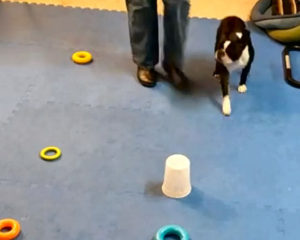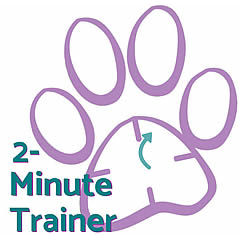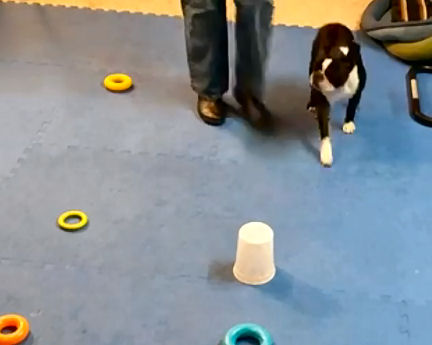Train, don’t complain.
After Rally class one evening we were standing around, talking with our students. One of the great things about getting involved in dog sports is the terrific people you meet. You may have absolutely nothing else in common, but there’s a connection you share. We all love doing stuff with our dogs. Anyway, she was saying that she didn’t dare bring her significant other to class because her dog would be distracted and want to go to him. Which is exactly the wrong way of looking at the situation. You shouldn’t avoid the things that distract your dog and cause them to lose focus. Train, don’t complain!
All the “excuses” we make
It doesn’t have to be something as big as a person. We’re all guilty of trying to avoid distracting our dogs. Have you ever hidden a toy behind your back? Or “shushed” someone making noise elsewhere in the house? Or asked a spectator at a dog even not to rattle that candy wrapper? Or keep dropping popcorn? Or wafting delicious hot dog smells into the ring?
Life is full of distractions. People drop things that make noise. At dog events people applaud. Or slam doors. And make announcements over public address systems.
We can’t keep our dogs in a sound-proof, distraction-proof bubble for training. To succeed, in competition and in life, dogs have to have the skills to tune out the distractions and focus on what’s important. We talked about this with the “Looky Loo” game previously.
Train through the distractions

If there’s someone in your family that your dog absolutely adores – do your training while that person is around. Every time your dog looks at you, have a party and reward. If the other person cooperates and ignores the dog, you should have your training partner focused in short order. When you and your dog succeed, the other person should celebrate along with you and your dog. This lets the dog know it’s okay to be with somebody else.
It’s really just a matter of proving to your dog that playing training games with you is more rewarding than anything else around. Easier said than done. But you can do it.
Distraction training
One of the very first household obedience classes we ever took had a wicked “final exam.” Keep in mind this was just a class at our local park district. Before class, our instructor picked up multiple orders of french fries from the golden arches place. And he threw them all over the floor in the training room. Our exam was to walk our dogs from one side of the room to the other. Without our dogs nabbing any of those yummy-smelling french fries.
And you know what? Every single one of the dogs (ours included) was able to do it. Because in just six weeks. our dogs learned that playing with us was more rewarding than anything else.
Take your time
Start out simply. Whenever there’s a tempting distraction, just reward your dog for looking at you. If it’s something the dog really, really loves, like their favorite person, make the reward the highest-value treat in your arsenal. Before long your dog will glance at the other person coming in and snap their attention to you – source of all things good and delicious.
Build up your dog’s tolerance for the distractions. You don’t want to flood the dog with so much input they’re overwhelmed. Be mindful and creative with your distractions. Before you dump a bowl of popcorn in your training area, start with boring wads of crumpled paper.
Build on success
Like all training, push ahead when your dog is successful most of the time at the level you’re at. When your dog can ignore their favorite person sitting still, can they still focus if that person is on the phone? walking around? headed for the door?
The key element is to realize when and how you’re protecting your dog from distractions. If you’re holding a toy behind your back so your dog won’t see it, it’s time to bring it to the front, stick it in your waistband, and let your dog see it. When your dog actually does what you’re asking for, whip that toy out and have a great game of tug. No more excuses. Train, don’t complain. Remember that dog training is a bargain we have with our dogs. They get what they want when we get what we want. It’s how all great teams function.







